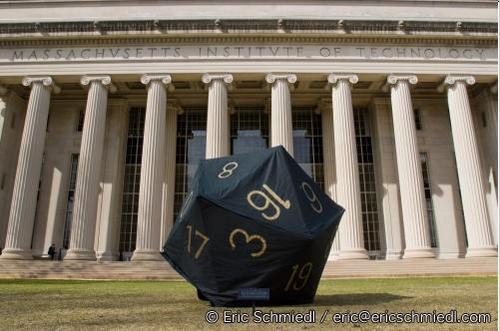 It's easy to criticize FlashForward for how hard it's trying to be "the next Lost". Having a serial story featuring jumping around in time and a big mystery isn't enough: they had to throw in an egregious out-of-place kangaroo (guess they couldn't afford an actual polar bear) and an Oceanic Airlines billboard (bragging a perfect safety record, and then later we hear about planes down all over the world). Plus one of the main characters is played by an actress familiar from Lost. There's even the possibility that we've got some token Mysterious Numbers to play with. So let's get that out of the way. FlashForward is trying way, way, way too hard to be "the next Lost." There, that's done.
It's easy to criticize FlashForward for how hard it's trying to be "the next Lost". Having a serial story featuring jumping around in time and a big mystery isn't enough: they had to throw in an egregious out-of-place kangaroo (guess they couldn't afford an actual polar bear) and an Oceanic Airlines billboard (bragging a perfect safety record, and then later we hear about planes down all over the world). Plus one of the main characters is played by an actress familiar from Lost. There's even the possibility that we've got some token Mysterious Numbers to play with. So let's get that out of the way. FlashForward is trying way, way, way too hard to be "the next Lost." There, that's done.But for all the familiar elements, the story is really not that similar to Lost, and I expect it will likely go in a very different direction, with the biggest similarity being the storytelling techniques, not the story itself. And some of the things that were annoying concessions to storytelling need in Lost (most notably the necessity that the characters rarely talk to one another about the odd things they'd seen or learned) will be better explained when they occur in FlashForward.
If you don't know the premise, it's no big spoiler to reveal it: everywhere in the world, at the same time, every human being blacks out for two minutes seventeen seconds, and has a vision of what they'll be doing at 10pm Pacific time on April 29, 2010. These visions are corroborated quickly: if one person had a vision showing them with another person, the other person also saw the same thing. Some of the visions are surprising: a character with no boyfriend sees herself 17 weeks pregnant, for instance. But all are possible and the big question, of course, is are they inevitable?
In all, I'm cautiously optimistic. Their exploration of the consequences of the premise has been mostly fearless and mostly complete. There's only one glaring hole so far. Everyone will know for six months in advance precisely what time that moment will be, yet when the moment comes, it seems the whole world is going to be taken by surprise by that moment, so no one will make sure to be in a place that gives them a useful vision. One guy will spend those minutes on the toilet reading the newspaper. No one's thought of spending those minutes looking at a big pad full of clues, the winning lottery numbers from mid-January, etc. Perhaps this will turn out to be relevant: perhaps this future can be changed (though I for one will find that disappointing), or perhaps the time will be wrong so it will catch everyone by surprise (though even then wouldn't you think you'd recognize the moment coming?), or something. I have hopes this hole will be explained, maybe even a clue... but the main character did, indeed, seem to be spending that time staring at a board full of clues, but as he did so, he seemed unaware that it was the moment, so it's still there.
One thing I very much liked is that the show really explored the consequences of a universal 2:17 blackout. And those consequences are grim. The number of car accidents alone would kill hundreds of thousands of people. We saw surfers who picked a bad moment to pass out and drowned as a result. We saw someone die on the operating table while the doctors and nurses all passed out. Airplanes fell out of the sky (though I suspect fewer would have done so than was depicted in the show; the vast majority of planes will hold heading for 2:17 easily, if they're not in a storm or in mid-landing or something). There are people who were injured or even died for nothing more dramatic than being walking up a flight of stairs at the key moment. And in the moments after, the chaos, panic, fear. Riots, looting, and gradual paranoia: will this happen again? Normalcy returned surprisingly fast, but that's okay, because the show's not supposed to be about all that stuff, but it's nice that they were unflinching in exploring it.
One question that immediately arose is, when people ask "what did you see?" what is the social protocol for how to answer, for when to ask? No one knows: this is unprecedented and there really isn't anything to suggest whether it's rude or tacky to ask someone what they saw, or whether to answer them, or whether to tell the whole truth. We saw the characters trying to figure that out. I like the idea that everyone everywhere is trying to spontaneously, emergently develop a new etiquette for a new situation, while balancing what impact that will have on the chance to avoid the bad things in their futures, or figure out what's going on.
Another good thing is that we've been told that April 29, 2010 will not be the end of the series, but near or at the end of this season, so we won't be dragging this out forever. Will they have figured out what's really going on by then? Probably not. Will there be more flash-forwards? If Lost taught us anything, it's that we can't even begin to guess where the story could potentially be going this early.
There were some flaws in execution, some uneven acting, a few bits of CGI that seemed suspicious, some odd cinematography, a few overused plot devices (I am particularly tired of the "alcoholic that falls off the bandwagon" storyline). But it's definitely got promise. It's worth sticking with it.
(Which unfortunately means I'm even farther behind on TV watching!)






























 RealTime and RTC
RealTime and RTC Prism
Prism Uncreated
Uncreated Bloodweavers
Bloodweavers Foulspawner's Legacy
Foulspawner's Legacy Lusternia
Lusternia